
Turnitin will be unavailable between 00:00 and 08:00 on Saturday 9 July 2022 for scheduled maintenance.
During this time, you will be unable to submit or grade any assessments.
We apologise for any inconvenience caused.

Turnitin will be unavailable between 00:00 and 08:00 on Saturday 9 July 2022 for scheduled maintenance.
During this time, you will be unable to submit or grade any assessments.
We apologise for any inconvenience caused.
Do you hold any category of HEA Fellowship (awarded by Advance HE)?
This may be Associate Fellow (AFHEA), Fellow (FHEA), Senior Fellow (SFHEA) or Principal Fellow (PFHEA).
If so, many congratulations! Your fellowship “demonstrates a personal and institutional commitment to professionalism in learning and teaching in higher education.” (Advance HE, Fellowship)
As part of our annual data returns, we need to make sure that we have records of all categories of fellowship holders. You can do this yourself by updating your ABW record. If you gained fellowship in another institution, you should also update your records with Advance HE to reflect your current post at Aberystwyth University.
Make sure that your ABW correctly records the category you currently hold. Remember to update your record if you are awarded a new category of fellowship.
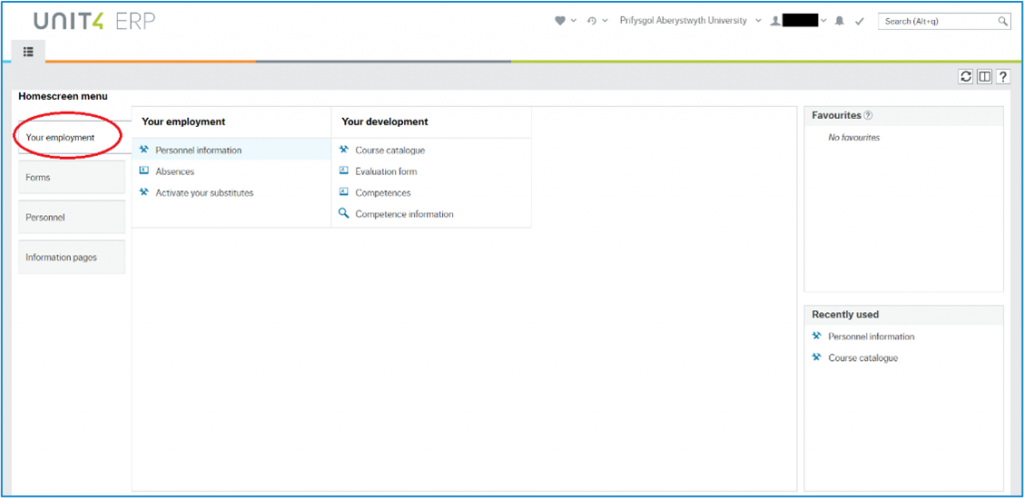
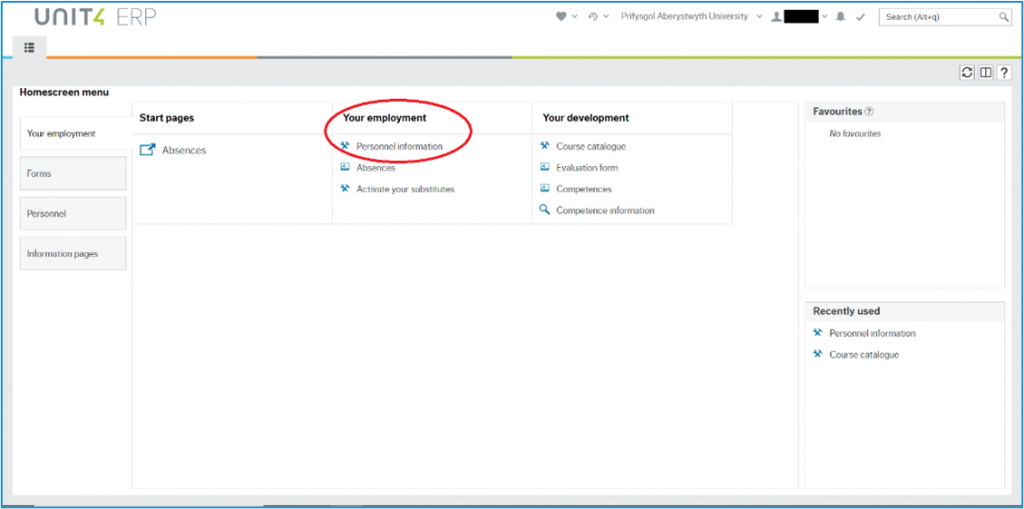

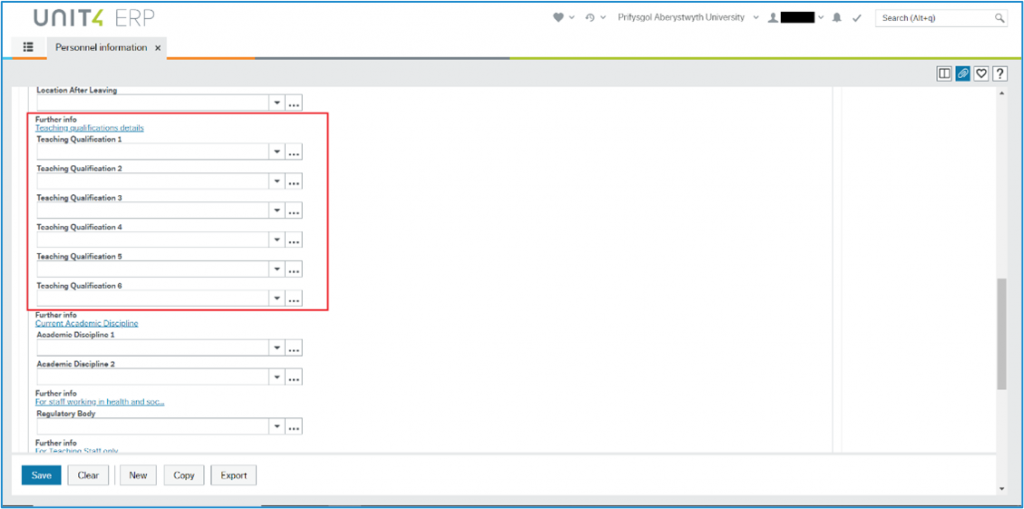
A dropdown list will open that includes several options that begin with Recognised by Advance HE as a….
Select the appropriate fellowship category.
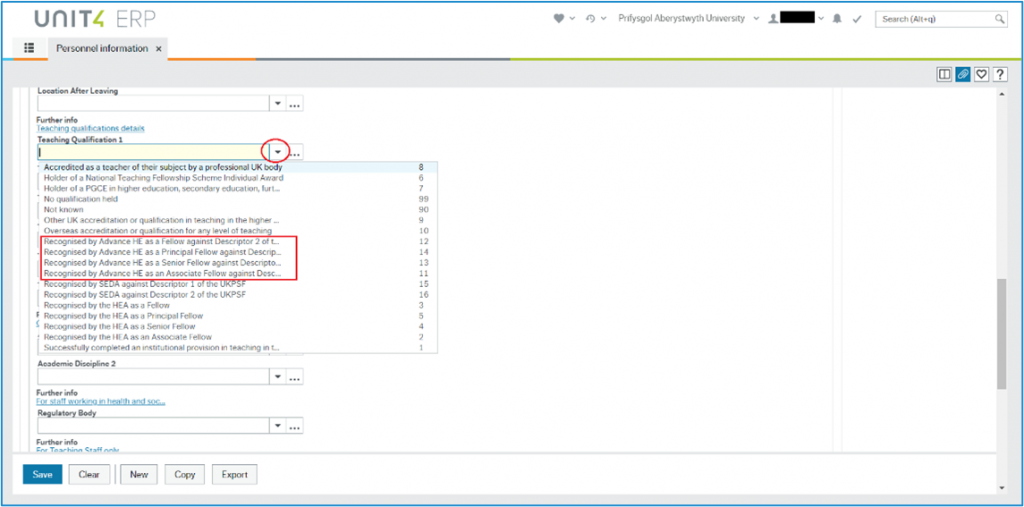
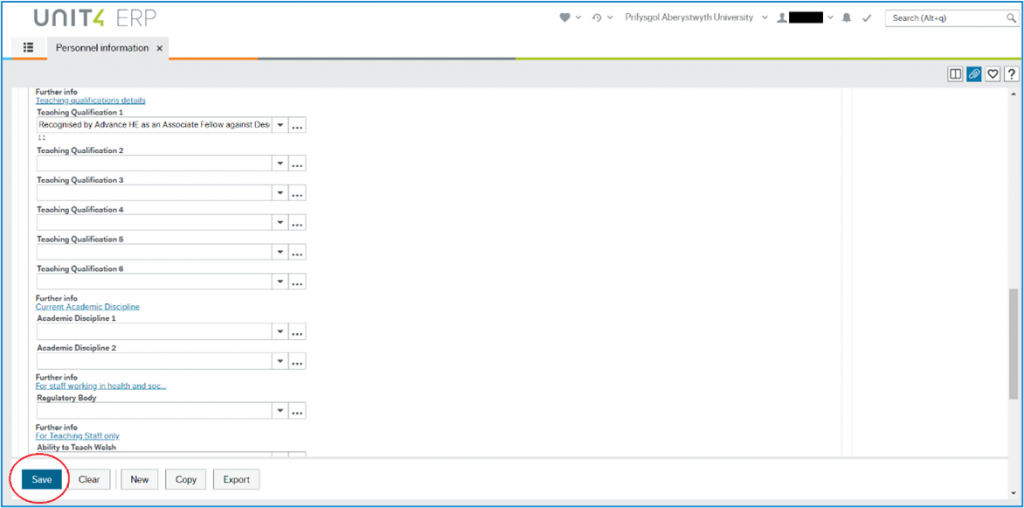
If you gained fellowship at another institution and have moved to AU, update your My Advance HE record to show your new Employer Relationship with Aberystwyth University.
And of course, if you are interested in applying for another fellowship category, you can apply for AFHEA, FHEA and SFHEA through the ARCHE scheme.

We are pleased to announce this year’s annual learning and teaching conference keynote (12-14 September 2022).
Kyra Araneta, Jennifer Fraser, and Moonisah Usman from the University of Westminster will be joining us virtually for their keynote speech, Navigating power lines: Developing principles and practices to support socially just student : staff partnerships.
In this keynote Kyra, Jennifer, and Moonisah will be discussing their successful staff-student partnership projects.
For many of us universities and classrooms are sites of possibility (hooks, 1994) that we invest with hopes for different futures for students and ourselves. They are also sites of tension as we navigate complex relationships and power dynamics. How we live education for liberation has become even more pressing in recent years with mobilisations for Black Lives Matter and calls to decolonise universities. In Power Lines: On the Subject of Feminist Alliances Aimee Carrillo Rowe asks ‘How do we build power lines that connect us to others in, through, and for justice?’ (2008, p. 2). Our keynote engages with this question to explore how we develop principles and practices to support socially just student : staff partnership relationships. We argue that, if designed for social justice, partnerships can create anti-racist and decolonial atmospheres (Bell, 2018) that become sites of possibility. Using examples from our work at the University of Westminster we engage with the intersections of power, allyship, social justice and partnership to consider strategies for building programmes that centre transformative relationships. We share examples of how we have built relationships, co-created programme values and enacted these in partnership projects. To illustrate how we can build partnerships with power lines that connect us for social justice we will use the example of the Pedagogies for Social Justice Project (https://blog.westminster.ac.uk/psj/). This project is committed to centring student voices in its values, beliefs and experiences and in using these to dismantle contemporary forms of coloniality in curricula, relationships and research. We argue that partnerships are pivotal to this work as they co-produce knowledge; develop new and critical ways of understanding disciplines; and undertake sustained collaboration, experimentation and dialogue. Understanding that these are challenging and complex processes, we offer this keynote as a step in your University’s and your own journeys toward creating socially just pedagogical spaces for students and staff.

As leader of our PGCTHE programme, I keep an eye out for resources to help staff teach effectively. These include webinars, podcasts, online toolkits, publications and more. Topics include active learning, online/blended teaching, accessibility/inclusion, and effective learning design based on cognitive science. Below I’ve listed items that came to my attention in the past week. In the interest of clarity, our policy is to show the titles and descriptions in the language of delivery.
Please see the Staff Training booking page for training offered by the LTEU and other Aberystwyth University staff. I hope you find this weekly resource roundup useful. If you have questions or suggestions, please contact our team at lteu@aber.ac.uk. You may also wish to follow my Twitter feed, Mary Jacob L&T.
For the academic year 2022/23 we will be using a new version of Turnitin.
On Tuesday 5 July 2022 Information Services will be enabling the new version of Turnitin on Blackboard. Whilst most of Turnitin’s current functionality will remain the same, there will be some changes. To help staff with this change, we have arranged the following FAQs.
Further information can be found on our Changes to Turnitin: Information for Staff blogpost.
Updated versions of all e-learning policies are available from the Information Services Regulations and Policies site.
Blackboard RMP and E-submission policies remain unchanged from last years. There have been some updates to the lecture capture policy. These include clarification on the retention period for recordings and guidance on using Panopto for assessment.
We will be hosting our 10th Annual Learning and Teaching Conference between 12-14 September 2022.
Conference Registration is now open. Further information, including the conference programme will be available on our Annual Learning and Teaching Conference webpage.
The student Digital Insights Survey has recently closed, with over 660 responses. Overseen by JISC, the survey asks students about their use of technology in learning and teaching, and provides a benchmark for comparisons with other institutions.
The results of the survey can be used to inform strategic decisions to enhance the digital experience and enable digital transformation.
Last year’s key findings can be found in the Student Digital Insights Survey Results blog post. Key findings of the 2022 survey will be published soon. Subscribe to the LTEU blog for notifications.
The ARCHE programme is a means by which Aberystwyth University (AU) staff can apply for Fellowship in the Higher Education Academy (now part of Advance HE). See the ARCHE scheme handbook for full details.
The next deadline for applications is 07/09/2022. To express an interest in applying, please email felstaff@aber.ac.uk.
The PGCTHE is open to staff teaching on Aberystwyth University courses. Participants should have at least 40 hours contact teaching time at higher education level over the duration of each module, but there is scope to consider staff with other scenarios on a case-by-case basis. Please email the course team for more information.
The next intake for both module 1 and module 2 will be in January 2023. The deadline for applications is 1 November. Attendance at induction is required for all students.
We will start recruiting for the next cohort of the Teaching for Postgraduates at Aberystwyth University programme this month. Any interested PGRs who are teaching can apply for a place on the programme up until 24th June. The compulsory Induction for the programme will take place on 20th and 21st September. Further information.
Subscribe to the Learning and Teaching Enhancement Blog so that you receive an email notification whenever a new post is written. Keep up-to-date with software developments, new initiatives, training sessions and events that help support teaching activities and technology-enhanced learning.
The Weekly Resource Roundup includes resources to help staff teach effectively, such as external webinars, podcasts, online toolkits, publications and more.
Attend sessions in our annual CPD programme.
The programme includes sessions on e-learning, as well as lots of sessions on learning and teaching topics such as assessment and feedback, presentation skills, accessibility, and more.
We deliver some sessions ourselves, while others are delivered by university staff whose teaching features good practice in those areas. Look for (L&T) in the session title.

Towards the end of July we will start to create Blackboard modules for 2022-23.
Unlike previous years, there will be no existing courses created blank. This decision was made at the recent Academic Board.
Course content and files will be copied over from the version of the module in the previous academic year. Turnitin submission points, Panopto recordings, and interactive Blackboard activities are not included in the copy; these will need to be rebuilt. We’ve got lots of FAQs to assist staff with this.
If you are running a new module then these will be created using your pre-agreed Departmental Templates. Similarly, if you are running a module that hasn’t run in the past couple of years then these will also be created blank.
If you have any questions about this process, please contact us (elearning@aber.ac.uk). Once the modules have been created, we will let you know.

As leader of our PGCTHE programme, I keep an eye out for resources to help staff teach effectively. These include webinars, podcasts, online toolkits, publications and more. Topics include active learning, online/blended teaching, accessibility/inclusion, and effective learning design based on cognitive science. Below I’ve listed items that came to my attention in the past week. In the interest of clarity, our policy is to show the titles and descriptions in the language of delivery.
Please see the Staff Training booking page for training offered by the LTEU and other Aberystwyth University staff. I hope you find this weekly resource roundup useful. If you have questions or suggestions, please contact our team at lteu@aber.ac.uk. You may also wish to follow my Twitter feed, Mary Jacob L&T.

For the academic year 2022/23 we will be using a new version of Turnitin.
On Tuesday 5 July Information Services will be enabling the new Turnitin on Blackboard.
Whilst most of Turnitin’s current functionality will remain the same, there will be some changes.
To help students with this change, we have arranged the following FAQs:
Our webpages and help guidance will be updated to reflect these changes.
If you have any questions, please do not hesitate to contact the Learning and Teaching Enhancement Unit (elearning@aber.ac.uk).

On 20 May, the Learning and Teaching Enhancement Unit were joined by Dr Mary Davies, Stephen Bunbury, Anna Krajewska, and Dr Matthew Jones for their online workshop: Contract Cheating Detection for Markers (Red Flags).
With other colleagues, they form the London South East Academic Integrity Network Contract Cheating Working Group and have been doing essential work and research into the increased use of essay mills and contract cheating.
The session included lots of practical tips for colleagues to help detect the use of Contract Cheating whilst marking.
The resources from the session are available below:
Further information on Unfair Academic Practice is available in the Academic Quality Handbook (see section 10).
Many thanks to the presenters. We’ve had such great external speaker sessions this academic year; take a look at our External Speakers blogposts for further information.

For the academic year 2022/23 we will be using a new version of Turnitin.
On Tuesday 5 July 2022 Information Services will be enabling the new version of Turnitin on Blackboard.
Whilst most of Turnitin’s current functionality will remain the same, there will be some changes.
To help staff with this change, we have arranged the following FAQs:
Further information can be found in our Turnitin LTI FAQs.
Our webpages and help guidance will be updated to reflect these changes. If you have any questions, please do not hesitate to contact the Learning and Teaching Enhancement Unit (elearning@aber.ac.uk).